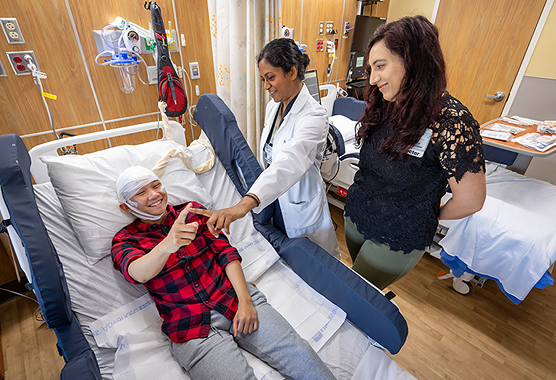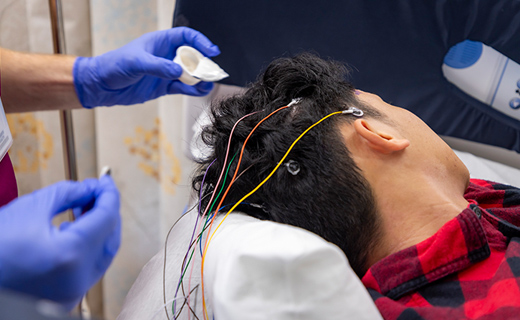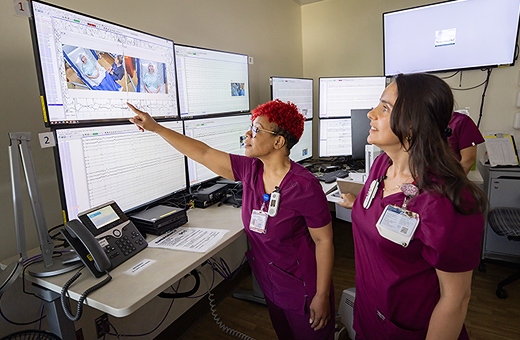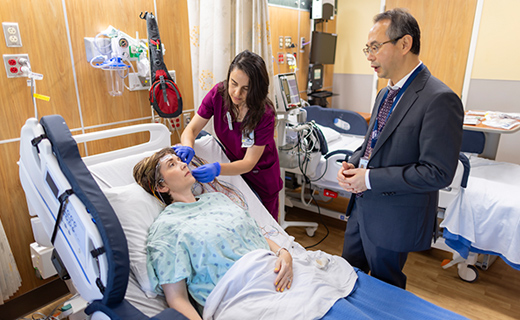Electroencephalogram (EEG)
Our EEG laboratory offers comprehensive EEG testing. You benefit from expert diagnosis and management of brain conditions like epilepsy.
Medically reviewed by Jack Lin, M.D. on July 10, 2025.

Comprehensive EEG Testing
We understand that needing tests for brain conditions can be stressful. Experts in our dedicated EEG laboratory perform thousands of EEGs on children and adults every year. This experience means we know how to ensure your comfort while performing tests that get fast, accurate results.
EEGs help our neurology (nervous system) experts diagnose and treat:
- Epilepsy and seizures
- Other brain disorders
Wide Range of EEG Options
An electroencephalogram (EEG) is a noninvasive, painless test that detects unusual electrical activity in your brain. Cells in your brain send signals through electrical impulses.
During an EEG, cup-shaped electrodes 1cm in diameter are placed on your scalp. They send information through thin wires that connect to a machine. The machine creates a graph of your brain waves.
Our neurologists use EEGs to assess your brain activity. This information helps our team diagnose and manage brain conditions. EEGs help us plan your treatment and certain surgical procedures. We offer routine and specialized EEGs.
Routine and Prolonged EEGs
A routine EEG takes about 30 minutes, while a prolonged EEG can take more than one hour. During the test, you may be exposed to stimuli like flashing lights or asked to breathe deeply to bring on brain changes that we measure.
Ambulatory EEG
You wear a small, portable EEG device for up to three days. The device measures your brain activity while you go about your usual activities and sleep.
Evoked Potentials Test
An evoked potentials test measures your brain activity during exposure to stimuli, such as flashing lights, sounds or electrical pulses. These tests help us diagnose vision and hearing problems, as well as brain, spine and nerve damage.
Stereoelectroencephalography (SEEG)
SEEG involves surgery to place electrodes deeper into the brain. You or your child stays in the hospital for a few days while your care team monitors your brain activity. SEEG helps us guide epilepsy surgery decisions.
Video EEG
This test records your activity and behaviors while you get an EEG. Providers see and hear what happens when you have a seizure or other brain changes. A video EEG can help us confirm an epilepsy diagnosis and guide epilepsy surgery decisions.
Request an Appointment
As Sacramento's No. 1 hospital, you'll benefit from unique advantages in primary care and specialty care. This includes prevention, diagnosis and treatment options from experts in 150 specialties.
Referring Physicians
To refer a patient, submit an electronic referral form or call.
800-4-UCDAVIS
Patients
Call to make an appointment.
Consumer Resource Center
800-2-UCDAVIS
Depending on the type of EEG, you or your child may get the test at our dedicated outpatient EEG lab or in the hospital epilepsy monitoring unit. A SEEG requires surgery and monitoring at our hospital. Your care team will explain how to prepare for your test.
-

Before an EEG
You can shampoo your hair before the test but don’t use hair conditioner or styling products like gels and sprays. You should avoid caffeinated foods and drinks for at least eight hours before an EEG. You may also need to stop taking certain medications. Some people may need to stay awake and be sleep deprived before an EEG.
-

During an EEG
You recline on a bed or chair while a technician uses a washable gel to stick electrodes onto your scalp. During the test, the technician may ask you to shut or open your eyes, take deep breaths or look at lights or other stimuli.
-

After an EEG
The technician will remove the electrodes and as much of the gel as possible. The rest of the gel will come out when you wash your hair at home. Unless your care team says otherwise, you can resume activities and eat as usual.
About EEGs
A neurologist who specializes in brain and nerve disorders reviews your EEG results. We’ll schedule a follow-up appointment to go over your results and next steps with you.
EEG Risks
EEGs are generally safe. If you have a seizure during an EEG, our care team has the expertise to ensure your safety. Any mild skin irritation from the gel or electrodes should go away in a day or so.
EEG Results
An EEG can show normal or unusual electrical activity and identify affected areas of your brain. When combined with other tests, EEG results can aid diagnosis and treatment decisions.
Next Steps
If an EEG indicates an increased risk for seizures, you will receive exceptional care at our level 4 Comprehensive Epilepsy Center. This designation from the National Association of Epilepsy Centers means we have the best diagnostic and treatment options available.

Ranked among the nation’s best hospitals
A U.S. News & World Report best hospital in cardiology, heart & vascular surgery, diabetes & endocrinology, ENT, geriatrics, neurology & neurosurgery, and pulmonology & lung surgery.

Ranked among the nation’s best children’s hospitals
U.S. News & World Report ranked UC Davis Children’s Hospital among the best in neonatology, nephrology, orthopedics*, pediatric & adolescent behavioral health, and pulmonology & lung surgery. (*Together with Shriners Children’s Northern California)

Ranked Sacramento’s #1 hospital
Ranked Sacramento’s #1 hospital by U.S. News, and high-performing in aortic valve surgery, back surgery (spinal fusion), COPD, colon cancer surgery, diabetes, gynecological cancer surgery, heart arrhythmia, heart failure, kidney failure, leukemia, lymphoma & myeloma, lung cancer surgery, pacemaker implantation, pneumonia, prostate cancer surgery, stroke, TAVR, cancer, orthopedics, gastroenterology & GI surgery, and urology.

The nation’s highest nursing honor
UC Davis Medical Center has received Magnet® recognition, the nation’s highest honor for nursing excellence.

World-class cancer care
One of ~59 U.S. cancer centers designated “comprehensive” by the National Cancer Institute.

A leader in health care equality
For the 13th consecutive year, UC Davis Medical Center has been recognized as an LGBTQ+ Healthcare Equality Leader by the educational arm of America’s largest civil rights organization.

